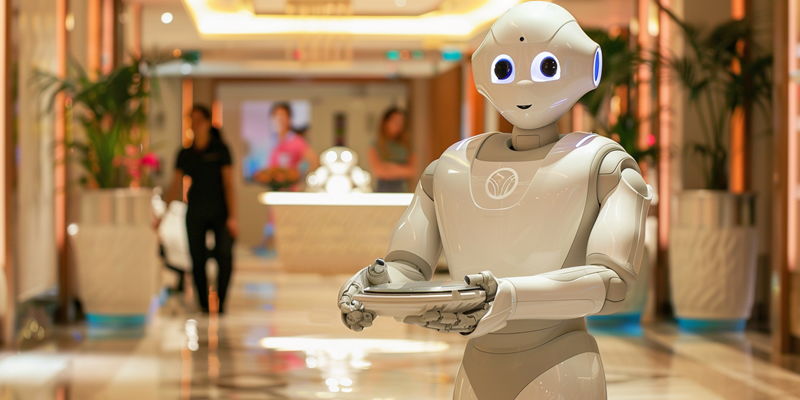In the wake of the pandemic, the American hospitality and leisure sector has struggled to bounce back fully due to a persistent labor shortage. This shortage not only presents a challenge for business operations but also threatens the quality of guest experiences, which are paramount in the industry. To address this critical issue, an innovative solution has become the focal point of discussion: the integration of collaborative robots, or cobots, into the service landscape. These robotic counterparts are not mere gadgets for display; they are transforming the way the hospitality industry approaches service, productivity, and guest satisfaction.
The Role of Cobots in Tackling Labor Shortages
The adoption of cobots in the hospitality sector is a game-changing initiative not just for overcoming staffing woes but also for redefining roles within the industry. These machines are programmed to handle repetitive and time-intensive chores, which traditionally consume a significant portion of a staff member’s workday. Assigning such tasks to cobots allows human employees to dedicate their time and expertise to more sophisticated and guest-centric tasks. This shift not only improves the efficiency of operations but also serves to enhance the overall guest experience.
The value of a cobot lies in its ability to perform consistently without breaks or the need for downtime, which is a stark contrast to the limitations of human endurance. This relentless capacity greatly increases operational throughput, especially valuable for the hospitality industry where peak times demand relentless service. By mitigating the staffing gaps and the resultant strain on service delivery, cobots effectively act as a buffer that allows companies to navigate the labor shortage with less disruption to their business and the guest experience they vow to provide.
Safety and Ease of Use: Cornerstones of Cobot Technology
Safety is a crucial consideration in any collaborative work environment, especially where machines and humans intersect. Cobots are well aware of their surroundings thanks to sophisticated sensor technology and vision systems that prevent collisions and ensure smooth interaction with human colleagues. This innovative design allows cobots and staff to work alongside each other in harmony, removing any fear of accidents and promoting a culture of mutual cooperation and safety.
Moreover, the allure of cobots extends to their simplicity in operation. With interfaces designed for intuitive use, these robots can be managed and reprogrammed by individuals without technical backgrounds. This ease of use drastically reduces the learning curve and deployment time, offering quick adaptability and flexibility in operations. Whether it means altering a cobot’s task for a busy weekend or reassigning its role to address a newly identified operational need, the user-friendly nature of cobot technology is key to their acceptance and effectiveness.
Cobots as Complementary Tools, Not Replacements
Contrary to concerns regarding job displacement, cobots in the hospitality industry serve as allies, not competitors. Their introduction is with the intention of augmenting the human workforce, handling the high-demand, low-interaction jobs such as food delivery to tables. This strategic distribution of tasks allows human workers to focus on what they do best: creating memorable experiences through personalized interaction, enhancing the guest experience in the process.
In an industry where the personal touch is often the defining factor in customer loyalty, cobots present an opportunity to elevate the standard of service. By automating the menial aspects of service, human staff can channel their skills towards engagement and hospitality that resonate with guests on a personal level. Such strategic collaboration between humans and cobots underscores a commitment to exceptional service, setting a new benchmark for the hospitality industry.
Impact on Employee Satisfaction and Turnover
The highly repetitive nature of certain hospitality tasks can lead to dissatisfaction and high turnover, particularly in roles like janitorial services. Cobots, by assuming these burdensome duties, have the potential to positively affect job satisfaction and retention rates. A workforce that is freed from the drudgery of mundane tasks has more space for creativity, problem-solving, and guest interactions – areas that provide higher job satisfaction and fulfillment.
Furthermore, when cobots deal with tasks that carry the risk of injury—be it dealing with hot equipment or heavy lifting—the result is a safer workplace. Preventing workplace injuries not only has a direct benefit in terms of reducing related costs for employers but also contributes to a more satisfied and protected workforce. Enhanced job satisfaction, coupled with an improved safety record, stands to stabilize the workforce, reduce turnover rates, and build a more dedicated team.
Beyond Hospitality: Cobots in Various Industries
The American hospitality and leisure industry has been grappling with a labor shortage since the pandemic, putting the quality of customer experiences at risk. As businesses in the sector seek a path to recovery, an inventive solution has come to the fore: the adoption of collaborative robots, also known as cobots. These advanced mechanical helpers are not just for show. They’re reshaping service delivery, boosting efficiency, and enhancing guest satisfaction in significant ways. As cobots join the workforce, they offer a blend of technology and practicality, potentially revolutionizing the industry by elevating the standard of services, even amidst staffing challenges. Their integration represents a forward-thinking approach to ensuring that the hospitality sector can thrive, providing high-quality experiences that keep customers returning.

